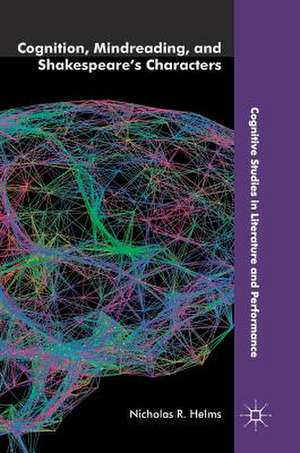Cognition, Mindreading, and Shakespeare's Characters: Cognitive Studies in Literature and Performance
Autor Nicholas R. Helmsen Limba Engleză Hardback – 6 feb 2019
Din seria Cognitive Studies in Literature and Performance
-
 Preț: 303.28 lei
Preț: 303.28 lei -
 Preț: 299.96 lei
Preț: 299.96 lei - 8%
 Preț: 537.27 lei
Preț: 537.27 lei -
 Preț: 302.20 lei
Preț: 302.20 lei -
 Preț: 299.34 lei
Preț: 299.34 lei -
 Preț: 301.10 lei
Preț: 301.10 lei -
 Preț: 381.98 lei
Preț: 381.98 lei -
 Preț: 392.37 lei
Preț: 392.37 lei -
 Preț: 386.81 lei
Preț: 386.81 lei - 15%
 Preț: 644.18 lei
Preț: 644.18 lei -
 Preț: 393.52 lei
Preț: 393.52 lei - 18%
 Preț: 784.92 lei
Preț: 784.92 lei - 15%
 Preț: 640.88 lei
Preț: 640.88 lei -
 Preț: 384.86 lei
Preț: 384.86 lei - 15%
 Preț: 647.08 lei
Preț: 647.08 lei - 15%
 Preț: 698.62 lei
Preț: 698.62 lei - 18%
 Preț: 730.02 lei
Preț: 730.02 lei - 15%
 Preț: 586.88 lei
Preț: 586.88 lei - 15%
 Preț: 584.43 lei
Preț: 584.43 lei - 15%
 Preț: 587.02 lei
Preț: 587.02 lei - 18%
 Preț: 725.26 lei
Preț: 725.26 lei - 18%
 Preț: 725.26 lei
Preț: 725.26 lei - 18%
 Preț: 730.97 lei
Preț: 730.97 lei - 15%
 Preț: 699.77 lei
Preț: 699.77 lei - 15%
 Preț: 640.88 lei
Preț: 640.88 lei
Preț: 528.13 lei
Preț vechi: 621.33 lei
-15% Nou
Puncte Express: 792
Preț estimativ în valută:
101.05€ • 105.52$ • 83.45£
101.05€ • 105.52$ • 83.45£
Carte tipărită la comandă
Livrare economică 15-29 aprilie
Preluare comenzi: 021 569.72.76
Specificații
ISBN-13: 9783030035648
ISBN-10: 3030035646
Pagini: 236
Ilustrații: X, 229 p.
Dimensiuni: 148 x 210 mm
Greutate: 0.44 kg
Ediția:1st ed. 2019
Editura: Springer International Publishing
Colecția Palgrave Macmillan
Seria Cognitive Studies in Literature and Performance
Locul publicării:Cham, Switzerland
ISBN-10: 3030035646
Pagini: 236
Ilustrații: X, 229 p.
Dimensiuni: 148 x 210 mm
Greutate: 0.44 kg
Ediția:1st ed. 2019
Editura: Springer International Publishing
Colecția Palgrave Macmillan
Seria Cognitive Studies in Literature and Performance
Locul publicării:Cham, Switzerland
Cuprins
1. The Mind’s Construction: An Introduction to Mindreading in Shakespeare.- 2. Reading the Mind: Cognitive Science and Close Reading.- 3. Inferring the Mind: Parasites and the Breakdown of Inference in Othello.- 4. Imagining the Mind: Empathy and Misreading in Much Ado About Nothing.- 5. Integrating Minds: Blending Methods in The King Is Alive and Twelfth Night.- 6. Finding the Frame: Inference in Romeo and Juliet.- 7. Reading Incoherence: How Shakespeare Speaks Back to Cognitive Science.- 8. Mindreading as Engagement: Active Spectators and "The Strangers' Case".
Notă biografică
Nicholas R. Helms is Instructor of English at the Hudson Strode Program in Renaissance Studies at The University of Alabama, USA. His research applies cognitive science to early modern drama and poetry. He also acts as artistic director of the Improbable Fictions staged reading series.
Textul de pe ultima copertă
Cognition, Mindreading, and Shakespeare's Characters brings cognitive science to Shakespeare, applying contemporary theories of mindreading to Shakespeare’s construction of character. Building on the work of the philosopher Alvin Goldman and cognitive literary critics such as Bruce McConachie and Lisa Zunshine, Nicholas Helms uses the language of mindreading to analyze inference and imagination throughout Shakespeare’s plays, dwelling at length on misread minds in King Lear, Much Ado About Nothing, Othello, and Romeo and Juliet. Shakespeare manipulates the mechanics of misreading to cultivate an early modern audience of adept mindreaders, an audience that continues to contemplate the moral ramifications of Shakespeare’s characters even after leaving the playhouse. Using this cognitive literary approach, Helms reveals how misreading fuels Shakespeare’s enduring popular appeal and investigates the ways in which Shakespeare’s characters can both corroborate andchallenge contemporary cognitive theories of the human mind.
Caracteristici
Applies theories of mindreading to Shakespeare Considers disability studies and age studies Provides practical methods for scholars, students, and performers
